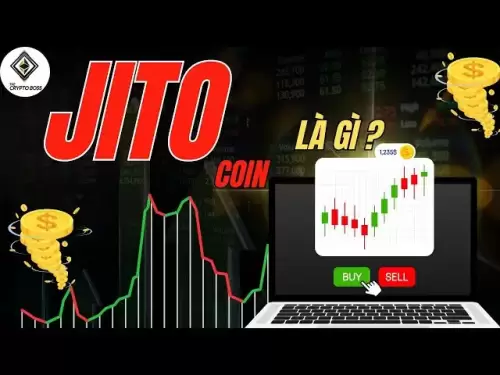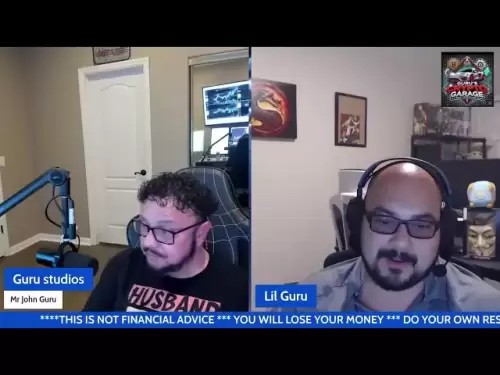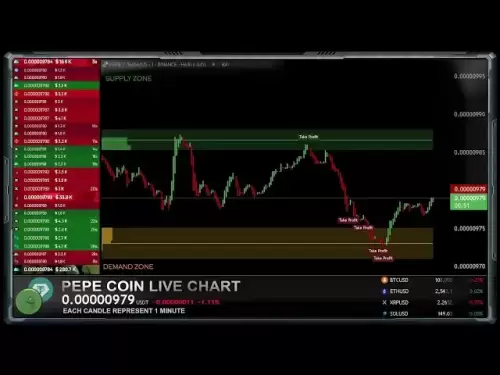-
 Bitcoin
Bitcoin $107,810.8710
-1.45% -
 Ethereum
Ethereum $2,531.4386
-1.75% -
 Tether USDt
Tether USDt $1.0000
-0.03% -
 XRP
XRP $2.2542
-0.99% -
 BNB
BNB $659.1350
-0.50% -
 Solana
Solana $148.5456
-2.40% -
 USDC
USDC $0.9999
-0.02% -
 TRON
TRON $0.2868
-0.44% -
 Dogecoin
Dogecoin $0.1666
-3.65% -
 Cardano
Cardano $0.5751
-2.36% -
 Hyperliquid
Hyperliquid $37.6845
-5.51% -
 Bitcoin Cash
Bitcoin Cash $494.9448
-0.65% -
 Sui
Sui $2.8396
-3.31% -
 Chainlink
Chainlink $13.2423
-2.59% -
 UNUS SED LEO
UNUS SED LEO $9.0482
0.02% -
 Stellar
Stellar $0.2467
-2.44% -
 Avalanche
Avalanche $17.8165
-3.63% -
 Shiba Inu
Shiba Inu $0.0...01158
-2.41% -
 Toncoin
Toncoin $2.7397
-3.42% -
 Hedera
Hedera $0.1560
-2.73% -
 Litecoin
Litecoin $85.8559
-2.34% -
 Monero
Monero $315.3710
-2.30% -
 Dai
Dai $1.0001
0.00% -
 Polkadot
Polkadot $3.3443
-2.03% -
 Ethena USDe
Ethena USDe $1.0001
0.01% -
 Bitget Token
Bitget Token $4.2888
-3.73% -
 Uniswap
Uniswap $7.3388
-1.57% -
 Aave
Aave $278.2986
-3.05% -
 Pepe
Pepe $0.0...09807
-3.67% -
 Pi
Pi $0.4563
-2.39%
How to buy and sell ETH through OTC trading?
OTC trading allows buying and selling large volumes of ETH directly between parties, offering better privacy and potentially better prices than traditional exchanges.
Apr 22, 2025 at 12:56 pm

OTC (Over-The-Counter) trading is a popular method for buying and selling cryptocurrencies like Ethereum (ETH) outside of traditional exchanges. This approach is often favored by traders looking for larger transactions, better privacy, and potentially better prices. In this article, we will explore the detailed process of how to buy and sell ETH through OTC trading, ensuring you understand every step involved.
Understanding OTC Trading
OTC trading involves transactions that occur directly between two parties without the supervision of an exchange. This method is particularly useful for large volume trades as it minimizes the impact on the market price and provides more privacy. OTC desks and brokers facilitate these trades, connecting buyers and sellers and often providing competitive pricing.
Finding an OTC Broker or Desk
To begin your journey into OTC trading, you need to find a reputable OTC broker or desk. Here are some steps to help you get started:
- Research: Look for well-established OTC desks that have a good reputation in the crypto community. Some popular OTC desks include Cumberland, Circle, and Genesis Trading.
- Check Reviews and Testimonials: Ensure the broker has positive feedback from other traders. Websites like Trustpilot can be useful for this.
- Verify Licensing and Compliance: Make sure the OTC desk is compliant with relevant regulations and has the necessary licenses to operate.
Setting Up an Account
Once you have selected an OTC broker, the next step is to set up an account. Here’s how to do it:
- Visit the OTC Desk’s Website: Navigate to the website of the chosen OTC desk.
- Register: Fill out the registration form with your personal details. This may include your name, email, and sometimes proof of identity.
- Verification: Most OTC desks require a verification process to comply with KYC (Know Your Customer) and AML (Anti-Money Laundering) regulations. You may need to submit documents such as a passport or driver’s license.
- Fund Your Account: After verification, you can deposit funds into your account. This can be done through bank transfers, wire transfers, or sometimes even crypto deposits.
Placing an Order to Buy ETH
Once your account is set up and funded, you can start placing orders to buy ETH. Here’s how to do it:
- Contact the OTC Desk: Reach out to your OTC broker via phone, email, or their trading platform to express your interest in buying ETH.
- Negotiate the Price: Discuss the price with the broker. OTC desks often provide competitive rates, but it’s important to negotiate to ensure you get the best deal.
- Specify the Amount: Clearly state the amount of ETH you wish to purchase. OTC trades are typically for large volumes, so be prepared to buy in significant quantities.
- Confirm the Transaction: Once you agree on the price and amount, the OTC desk will confirm the transaction details and execute the trade.
- Receive Your ETH: After the trade is executed, the ETH will be transferred to your designated wallet. Ensure you have a secure wallet ready to receive the ETH.
Selling ETH Through OTC Trading
Selling ETH through OTC trading follows a similar process but in reverse. Here’s how to do it:
- Contact the OTC Desk: Inform your OTC broker that you want to sell ETH.
- Negotiate the Price: Discuss the selling price with the broker. As with buying, negotiating is key to getting a favorable rate.
- Specify the Amount: State the amount of ETH you wish to sell. Again, OTC trades are usually for large volumes.
- Confirm the Transaction: Once you agree on the price and amount, the OTC desk will confirm the transaction details and execute the trade.
- Receive Your Funds: After the trade is executed, the funds will be transferred to your designated bank account or another payment method as agreed upon.
Ensuring Security and Privacy
Security and privacy are paramount when engaging in OTC trading. Here are some tips to ensure your transactions are secure:
- Use Secure Wallets: Always transfer your ETH to a secure wallet. Hardware wallets like Ledger or Trezor are highly recommended.
- Verify Transactions: Double-check all transaction details before confirming a trade. Ensure the recipient address and amount are correct.
- Protect Your Information: Be cautious about sharing personal information. Only provide necessary details to verified and reputable OTC desks.
- Monitor Your Accounts: Regularly check your OTC account and wallet for any suspicious activity. Report any issues to the OTC desk immediately.
Understanding Fees and Costs
OTC trading often involves different fee structures compared to traditional exchanges. Here’s what you need to know:
- Transaction Fees: OTC desks may charge a fee for facilitating the trade. This fee can be a percentage of the transaction value or a flat rate.
- Transfer Fees: There may be fees associated with transferring funds to and from your OTC account. These can include bank transfer fees or crypto network fees.
- Negotiable Fees: In some cases, fees can be negotiated, especially for large volume trades. It’s worth discussing this with your OTC broker.
FAQs
Q: Can I use OTC trading for small amounts of ETH?
A: OTC trading is typically designed for larger transactions. While some OTC desks may accommodate smaller trades, it’s more common for them to focus on high-volume deals. For smaller amounts, traditional exchanges might be more suitable.
Q: How long does it take to complete an OTC trade?
A: The duration of an OTC trade can vary depending on the OTC desk and the specifics of the transaction. Generally, OTC trades can be completed within a few hours to a few days. It’s important to discuss the timeline with your OTC broker before initiating a trade.
Q: Is OTC trading available worldwide?
A: Availability of OTC trading can vary by country due to regulatory differences. It’s essential to check if OTC trading is available in your region and whether the OTC desk you choose operates in your country.
Q: Can I trade other cryptocurrencies through OTC desks?
A: Yes, many OTC desks support trading of various cryptocurrencies beyond ETH, such as BTC, LTC, and others. It’s best to check with the OTC desk to see which cryptocurrencies they support.
Disclaimer:info@kdj.com
The information provided is not trading advice. kdj.com does not assume any responsibility for any investments made based on the information provided in this article. Cryptocurrencies are highly volatile and it is highly recommended that you invest with caution after thorough research!
If you believe that the content used on this website infringes your copyright, please contact us immediately (info@kdj.com) and we will delete it promptly.
- XLM Price Prediction: Is Stellar Ready for a Breakout?
- 2025-07-08 19:10:13
- Memecoin Mania: V2EX, Pump.fun, and the Wild West of Crypto
- 2025-07-08 19:50:12
- Dogecoin, Shiba Inu, Little Pepe: Meme Coin Mania or Future Finance?
- 2025-07-08 19:50:12
- Iron Maiden's 50th Anniversary: A Royal Mint Tribute in Metal!
- 2025-07-08 19:55:12
- DAI Stablecoin: Your Ace in the Hole for Online Casinos and Gambling Sites?
- 2025-07-08 19:55:12
- Token Investment in Q4 2025: Riding the Little Pepe Wave to 100x Gains?
- 2025-07-08 20:00:11
Related knowledge

How to customize USDT TRC20 mining fees? Flexible adjustment tutorial
Jun 13,2025 at 01:42am
Understanding USDT TRC20 Mining FeesMining fees on the TRON (TRC20) network are essential for processing transactions. Unlike Bitcoin or Ethereum, where miners directly validate transactions, TRON uses a delegated proof-of-stake (DPoS) mechanism. However, users still need to pay bandwidth and energy fees, which are collectively referred to as 'mining fe...

USDT TRC20 transaction is stuck? Solution summary
Jun 14,2025 at 11:15pm
Understanding USDT TRC20 TransactionsWhen users mention that a USDT TRC20 transaction is stuck, they typically refer to a situation where the transfer of Tether (USDT) on the TRON blockchain has not been confirmed for an extended period. This issue may arise due to various reasons such as network congestion, insufficient transaction fees, or wallet-rela...

How to cancel USDT TRC20 unconfirmed transactions? Operation guide
Jun 13,2025 at 11:01pm
Understanding USDT TRC20 Unconfirmed TransactionsWhen dealing with USDT TRC20 transactions, it’s crucial to understand what an unconfirmed transaction means. An unconfirmed transaction is one that has been broadcasted to the blockchain network but hasn’t yet been included in a block. This typically occurs due to low transaction fees or network congestio...

How to check USDT TRC20 balance? Introduction to multiple query methods
Jun 21,2025 at 02:42am
Understanding USDT TRC20 and Its ImportanceUSDT (Tether) is one of the most widely used stablecoins in the cryptocurrency market. It exists on multiple blockchain networks, including TRC20, which operates on the Tron (TRX) network. Checking your USDT TRC20 balance accurately is crucial for users who hold or transact with this asset. Whether you're sendi...

What to do if USDT TRC20 transfers are congested? Speed up trading skills
Jun 13,2025 at 09:56am
Understanding USDT TRC20 Transfer CongestionWhen transferring USDT TRC20, users may occasionally experience delays or congestion. This typically occurs due to network overload on the TRON blockchain, which hosts the TRC20 version of Tether. Unlike the ERC20 variant (which runs on Ethereum), TRC20 transactions are generally faster and cheaper, but during...

The relationship between USDT TRC20 and TRON chain: technical background analysis
Jun 12,2025 at 01:28pm
What is USDT TRC20?USDT TRC20 refers to the Tether (USDT) token issued on the TRON blockchain using the TRC-20 standard. Unlike the more commonly known ERC-20 version of USDT (which runs on Ethereum), the TRC-20 variant leverages the TRON network's infrastructure for faster and cheaper transactions. The emergence of this version came as part of Tether’s...

How to customize USDT TRC20 mining fees? Flexible adjustment tutorial
Jun 13,2025 at 01:42am
Understanding USDT TRC20 Mining FeesMining fees on the TRON (TRC20) network are essential for processing transactions. Unlike Bitcoin or Ethereum, where miners directly validate transactions, TRON uses a delegated proof-of-stake (DPoS) mechanism. However, users still need to pay bandwidth and energy fees, which are collectively referred to as 'mining fe...

USDT TRC20 transaction is stuck? Solution summary
Jun 14,2025 at 11:15pm
Understanding USDT TRC20 TransactionsWhen users mention that a USDT TRC20 transaction is stuck, they typically refer to a situation where the transfer of Tether (USDT) on the TRON blockchain has not been confirmed for an extended period. This issue may arise due to various reasons such as network congestion, insufficient transaction fees, or wallet-rela...

How to cancel USDT TRC20 unconfirmed transactions? Operation guide
Jun 13,2025 at 11:01pm
Understanding USDT TRC20 Unconfirmed TransactionsWhen dealing with USDT TRC20 transactions, it’s crucial to understand what an unconfirmed transaction means. An unconfirmed transaction is one that has been broadcasted to the blockchain network but hasn’t yet been included in a block. This typically occurs due to low transaction fees or network congestio...

How to check USDT TRC20 balance? Introduction to multiple query methods
Jun 21,2025 at 02:42am
Understanding USDT TRC20 and Its ImportanceUSDT (Tether) is one of the most widely used stablecoins in the cryptocurrency market. It exists on multiple blockchain networks, including TRC20, which operates on the Tron (TRX) network. Checking your USDT TRC20 balance accurately is crucial for users who hold or transact with this asset. Whether you're sendi...

What to do if USDT TRC20 transfers are congested? Speed up trading skills
Jun 13,2025 at 09:56am
Understanding USDT TRC20 Transfer CongestionWhen transferring USDT TRC20, users may occasionally experience delays or congestion. This typically occurs due to network overload on the TRON blockchain, which hosts the TRC20 version of Tether. Unlike the ERC20 variant (which runs on Ethereum), TRC20 transactions are generally faster and cheaper, but during...

The relationship between USDT TRC20 and TRON chain: technical background analysis
Jun 12,2025 at 01:28pm
What is USDT TRC20?USDT TRC20 refers to the Tether (USDT) token issued on the TRON blockchain using the TRC-20 standard. Unlike the more commonly known ERC-20 version of USDT (which runs on Ethereum), the TRC-20 variant leverages the TRON network's infrastructure for faster and cheaper transactions. The emergence of this version came as part of Tether’s...
See all articles

























































































